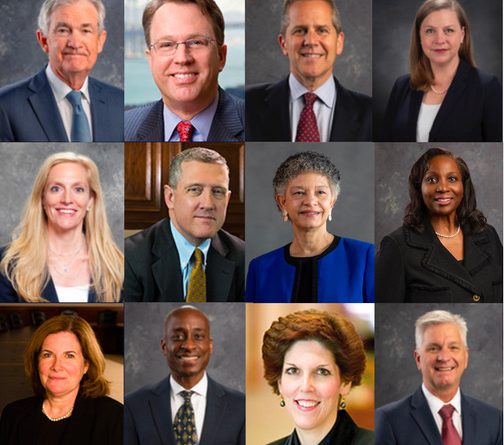Missing the Point – The Fed ‘Committee’ we need to do something about
In order as listed on the Fed’s website, top to bottom, left to right… Jerome Powell, Board of Governors, Chair. John Williams, New York, Vice Chair. Michael Barr, Board of Governors. Michelle Bowman, Board of Governors. Lael Brainard, Board of Governors. James Bullard, St. Louis. Susan Collins, Boston. Lisa Cook, Board of Governors. Esther George, Kansas City. Philip Jefferson, Board of Governors. Loretta Mester, Cleveland. Christopher Waller, Board of Governors.
What if I told you that there is, inside our federal government, a committee of 12 unelected officials who, meeting in secret, make decisions about whether or not you work and how much you make? A committee of just 12 “Members” that doesn’t answer to the President or to anyone else for that matter. It may sound like the basis for some fictional conspiracy theory. Unfortunately, it’s all too real.
By the time you read this, the Fed will have raised interest rates again, having failed so far, despite its prodigious efforts, to bring the American Economy to its knees in order to reduce the rate of inflation. This week’s data show that prices are falling overall, for which the Fed will take credit no doubt, but not enough to discourage yet another increase in the cost of borrowing money.
The economy continues to be surprisingly strong, despite the Fed’s best efforts to the contrary. Unfortunately, the Fed interprets this persistent strength as indicative that it has more work to do. It never occurs to the Fed that increasing rates might be ineffective and is quite possibly counterproductive, impeding the pace at which prices would be falling without the Fed’s involvement.
With only a single tool that can’t differentiate among the great variety of markets where inflation is occurring, the Fed is pounding indiscriminately on the entire economy. Jobs and family incomes lost are just collateral damage, numbers on a report discussed behind closed doors.
Do you really think, for example, that inflation in the markets determining apartment rentals and groceries have anything in common? Of course not, but the Fed is blind to those distinctions. Not to mention, impatient. Changes to our economy take time, more so in some markets than in others. It’s the arrogance of the Fed that it treats these “sensitivities,” these “lags” as if it (the Fed) were adjusting dials on some recording studio sound board, the response to which should be more or less instantaneous. …Who are these people?
And then there is the ongoing debate over whether, when the Fed is finally done raising rates, the economy will have a “soft landing” or serious recession. Even assuming a soft landing, hundreds of thousands of jobs will be lost because of what the Fed is doing. In what small “d” democratic context is that an acceptable outcome?
The Fed’s idea is simple. Our economy is driven by consumer demand. Reduce demand and prices will fall. The problem is that the Fed’s way to reduce consumer demand is by causing unemployment and reducing household income. For the Fed, it’s just business. Statistics on a spreadsheet. For the affected middle- and lower-income families in America, it’s people’s lives we’re talking about.
That raising interest rates may, in fact, result in lower prices by virtue of its blunt force impact on the demand for goods and services – through its adverse effects on American jobs and household incomes – doesn’t make it good government policy. Far from it. What the Fed is doing weakens our economy, making us less competitive in the process, because higher rates have a disproportionately negative impact on smaller businesses. The stronger and more competitive our economy, the more efficiently it can resolve the problems of excessive inflation on its own.
“So why doesn’t President Biden just tell the Fed to stand down?”
Because the Fed is one of our government’s 66 “independent agencies” that are part of the Administrative branch, but answer only to Congress. The President has virtually no authority over the Fed. This was done, ostensibly, to make the management of the nation’s banking system free from political influence, which is a good idea in general, but shouldn’t extend to the authority of the Fed to make general purpose economic policy. No, no, no. Economic policy has got to involve “political influence” so that the millions of affected families that are going to lose income and jobs will have a say in the design and implementation of those policies.
“I gather that’s not what happening now, is it?”
Not even close. The Federal Reserve sets monetary policy through its Federal Open Market Committee. The committee consists of just 12 people… all seven members of the Fed’s Board of Governors, plus the presidents of five of the Fed’s regional banks. Just 12 individuals who have nothing in common with the over 330 million “regular people” whose lives they’re going to impact so dramatically. With no one to hold them responsible for the consequences of their actions.
“Who died and made them king?”
What you’re seeing is the virtually unfettered excise of financial power in a way that is purposely – by virtue of the Fed’s status as an independent agency – outside our representative government. Making matters worse, its policy making that reflects a complete misunderstanding of the microeconomics of the many and various markets that collaboratively define our capitalist economy. In short, the Fed is practicing an administratively simple, intellectually lazy solution that is, at least, disrespectful of how markets work.
Increasing interest rates is making matters worse and hurting the real families who, collectively, comprise the economy we’re always talking about. What can we do about it? Congress needs to modify the language of the Fed’s independent agency status and rescind the Fed’s authority to make economic policy outside of representative government. Take the Fed out of business of fighting inflation. Economic policy is too important be made by an unelected society of 12 people operating in secrecy behind closed doors, answering to no one for the consequences of their actions.

Les Cohen is a long-term Marylander, having grown up in Annapolis. Professionally, he writes and edits materials for business and political clients from his base of operations in Columbia, Maryland. He has a Ph.D. in Urban and Regional Economics. Leave a comment or feel free to send him an email to [email protected].

